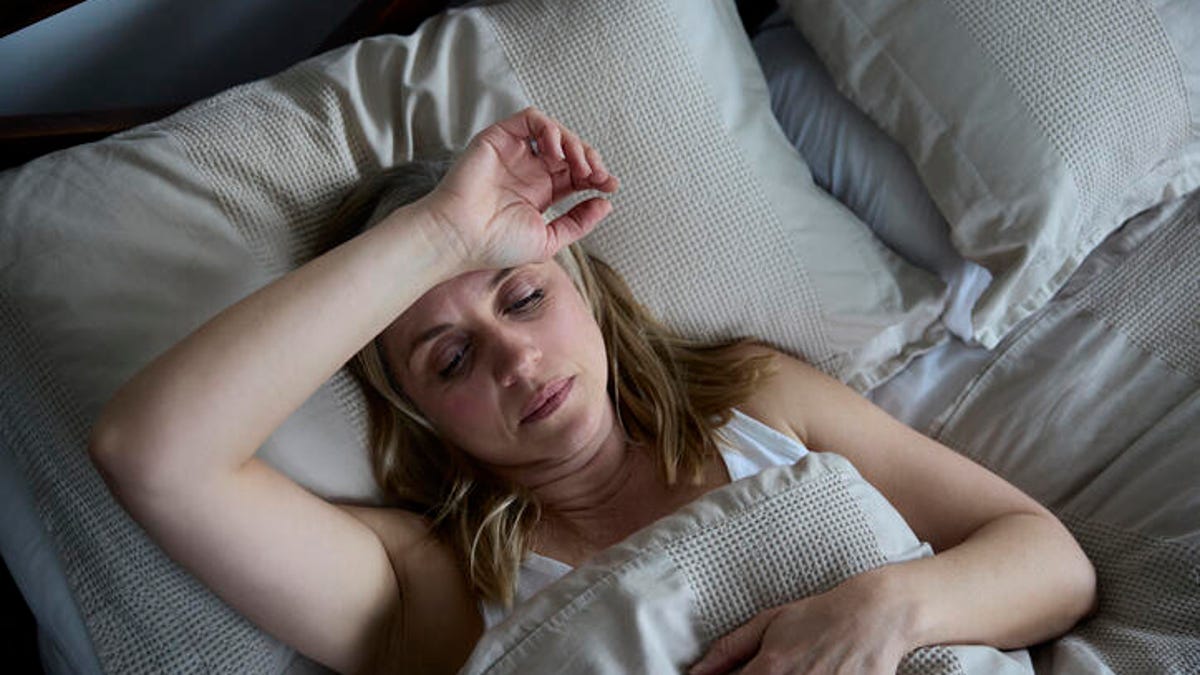
Sweating is how our body regulates temperature. It doesn’t just happen while we’re awake; our bodies are still trying to maintain our body temperature at night. Most of the time, you don’t even notice it happens. For some people, they can sweat so much that their clothing and sheets are soaked through. This occurrence is known as night sweats, and can sometimes be linked to an underlying disease.
For some people, night sweats happen frequently — and not just because they’re a hot sleeper or have too many blankets on their bed. Night sweating often points to something bigger that’s impacting your sleep. Let’s review the common causes and what you can do about it.
4 things that might be causing your night sweats
Besides using too heavy of a blanket or having your temperature cranked up a little too high, there are several reasons why you may wake up with significant sweating.
Hormonal changes
During significant hormonal changes in the body, like menopause or pregnancy, night sweats are more likely to occur. Heat flashes are a staple in perimenopause and menopause, with more than 80% of women reporting regular hot flashes. Low testosterone and hyperthyroidism have also been linked to excessive sweating.
Your nightly routine
Sometimes, sweating at night is directly associated with what we do before sleep. Activities that may increase sweating at night include drinking caffeine or alcohol, eating spicy foods, and exercising too close to bedtime.
To see if your night sweats are related to your routine, it’s best to eliminate them consistently and note if your sweating decreases. Small changes in your routine could significantly impact your comfort at night.
Anxiety and stress
If you’ve been under increased stress or feeling particularly anxious, you may experience night sweats.
Anxiety is a common mental health condition that evokes physical responses. Stress and anxiety trigger your sympathetic nervous system, and the fight or flight response takes over. Adrenaline and the stress hormone cortisol are released, which causes your heart rate to increase, your breathing to quicken and your sweat glands to activate.
Unfortunately, anxiety doesn’t just plague us when we’re awake. Night sweats are a known symptom of anxiety disorders. Anxiety and sleeping can become a vicious cycle if not addressed. Your anxiety can keep you up at night, but if you don’t get enough sleep, then your anxiety symptoms can get worse.
Consider adding journaling, meditation, deep breathing or relaxing activities into your nightly routine to try to ease anxiety before bed.
Underlying medical conditions and medications
Night sweats can be related to something you ate, the stress you’re under or regular life changes, like menopause. Other times, there’s no obvious source of your night sweats, which suggests something like an underlying medical condition may be causing it. According to the American Family Physician Journal, serious disorders can cause night sweats, but it’s not the norm.
Conditions that can cause night sweats include but are not limited to:
- Hyperhidrosis
- Mood disorders
- Infections
- Diabetes and hypoglycemia
- Some types of cancer, like lymphoma and leukemia
- Gastroesophageal reflux disease
- Neurological disorders
- Hyperthyroidism
- Sleep apnea
New medications also may be triggering your night sweats. Medications that are known to have this side effect include antidepressants, pain medications, diabetes medications and insulin, cardiovascular medications, and hormonal medications.
3 things to do about your night sweats at home
Night sweats are uncomfortable and can disturb the quality of sleep you can get. Thankfully, you can change your sleeping environment to ease symptoms at home.
Invest in cooling bedding
When it comes to night sweats, what you sleep on can make your symptoms better or worse. No matter the cause of your night sweats, investing in cooling bedding can make you more comfortable at night. There are cooling products at every level of bedding materials — from mattresses to sheets to cooling pillows.
Cooling products will have additional materials to help deliver cooling. Many mattresses have foam layers infused with gel, graphite and copper or have phase-changing covers. Or their construction makes them naturally more breathable. This is the case for latex foam beds with perforations allowing more airflow. It doesn’t actively cool you, but it can help ensure you don’t get hotter because of your bed. Other options will be cool to the touch, like GhostBed or Brooklyn Bedding Aurora.
Wear the right things to bed
If you wake up in sweat-soaked clothes, you may be inclined to skip clothes entirely. However, sleeping naked can work against you regarding temperature. When it comes to sweat, clothes help wick the sweat away from the body and allow you to cool down. Without them, the sweat collects on the skin and seeps into the mattress. You’ll be better off wearing light, loose-fitting pajamas to bed than sleeping naked.
Change your environment
If you sweat at night, it’s worth changing your sleeping environment to accommodate it. For example, change your bedding from heavy materials to lightweight, breathable options.
Sleep experts suggest that 65 degrees Fahrenheit (18.3 degrees Celsius) is the ideal temperature for sleeping. Set your thermostat close to that, or add a window unit or fan to your bedroom. Other helpful cooling tips involve freezing your pillowcase or placing a bowl of ice behind the fan that’s blowing air on you.
When should you see a doctor about night sweats?
Night sweats that happen occasionally due to something like eating spicy food aren’t something you need to worry about. It’s when it starts to impact your ability to sleep or has no apparent cause that you should speak with your doctor. They can help you determine if your night sweats are related to an underlying condition or the medication you’re taking or help you manage a hormonal imbalance.
